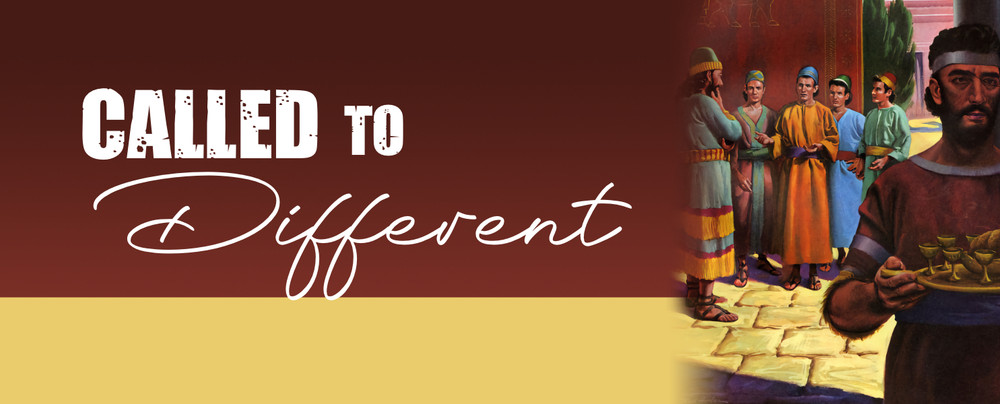
They were among the brightest and most physically attractive young men in the nation. Some of them were royalty and others from the wealthiest and most educated segments of society. Many looked to these gifted youth to do great things for their country. Then came war and exile. Life in a new and unfamiliar land. Captives. A new language, new clothes, a new name, new foods, and strange new gods and forms of worship. Such was the experience of the young Hebrew men described in the Bible in the first chapter of Daniel.
Expected to be groomed to serve at the highest levels of government under their new ruler, some of these men came to their new surroundings with more than outward appearances initially revealed. We are told that “the king appointed for them a daily provision of the king’s delicacies and of the wine which he drank, and three years of training for them, so that at the end of that time they might serve before the king.”[1]
The Bible then focuses our attention on four of these men and the experiences that ensued as a result of their choices. Not wanting to defile themselves with the king’s food and wine, Daniel, Hananiah, Mishael, and Azariah requested their steward to allow them 10 days to prove that a simple plant-based diet and water would be far superior in supporting their health and strength as compared to that offered by the king. Continuing in Daniel 1 we learn that “at the end of 10 days their features appeared better and fatter in flesh than all the young men who ate the portion of the king’s delicacies.”[2] Further we read that “in all matters of wisdom and understanding about which the king examined them, he found them 10 times better than all the magicians and astrologers who were in all his realm.”[3]
So what was it about the diet that Daniel and his friends followed that caused them to surpass others in physical and intellectual skill, even among the most esteemed in all of Babylon? To start with, we know that man’s first diet was based solely on plants – “And God said, “See, I have given you every herb that yields seed which is on the face of all the earth, and every tree whose fruit yields seed; to you it shall be for food.””[4] As Creator, God designed man’s diet based on his unique physiology, which God himself had made (see Gen 2:7).
After years of research on diet and its impact on health and longevity, many have concluded that the choice of diet made by Daniel and his friends is still the healthiest choice today. According to the World Health Organization “A healthy diet includes the following: Fruit, vegetables, legumes (e.g. lentils and beans), nuts and whole grains (e.g. unprocessed maize, millet, oats, wheat and brown rice).”[5] Likewise, according to the Academy of Nutrition and Dietetics, “appropriately planned vegetarian, including vegan, diets are healthful, nutritionally adequate and may provide health benefits in the prevention and treatment of certain diseases.”[6]
Interestingly, listed at the base of the Blue Zones Food Guidelines[7] is daily use of 95-100% plant-based foods, derived from their finding that one of the common dietary characteristics of those areas of the world where people live the longest is dependence on plant foods. Whole (not highly processed) foods, beans, nuts and mostly water are also specified in these guidelines for daily use.
Because they are known to be lower in saturated fat and cholesterol, and high in fiber, vitamins, minerals and antioxidants, plant-based diets have been shown to reduce the risk of a number of lifestyle diseases such as diabetes, heart disease, hypertension, obesity and certain cancers.
Surprising to many, this understanding of diet as it relates to human health was well recognized over a 100 years ago by Ellen G. White, who wrote extensively on the importance of plant-based eating. “Grains, fruits, nuts, and vegetables constitute the diet chosen for us by our Creator. These foods, prepared in as simple and natural a manner as possible, are the most healthful and nourishing. They impart strength, a power of endurance, and vigor of intellect that are not afforded by a more complex and stimulating diet.”[8]
Still wondering what to eat for lunch? Let’s follow in the footsteps of Daniel and purpose in our hearts to choose the path of life and health as shown us by our loving Creator.
By Jeanne Wheaton, MS, RDN
[1] Daniel 1:5 (NKJV)
[2] Daniel 1:15 (NKJV)
[3] Daniel 1:20 (NKJV)
[4] Genesis 1:29 (NKJV)
[5] World Health Organization, “Healthy Diet: Key Facts” https://www.who.int/news-room/fact-sheets/detail/healthy-diet (April 2020)
[6] Academy of Nutrition and Dietetics, “Building a Healthy Vegetarian Diet Myths and Facts.” https://www.eatright.org/food/nutrition/vegetarian-and-special-diets/building-a-healthy-vegetarian-diet-myths (Oct. 2021)
[7] Blue Zones, “Food Guidelines.” https://www.bluezones.com/recipes/food-guidelines/
[8] White, E.G. (1905). The Ministry of Healing. Mountain View, CA: Pacific Press Publishing Association
